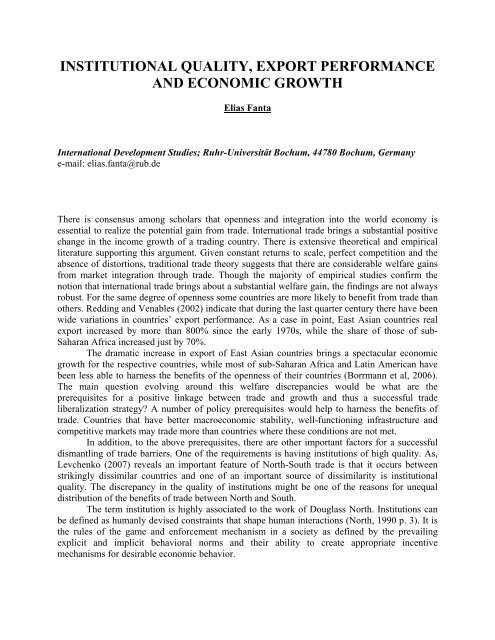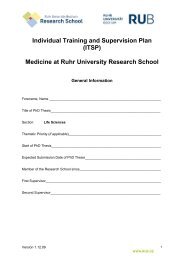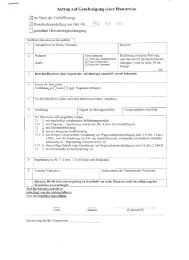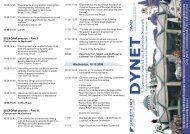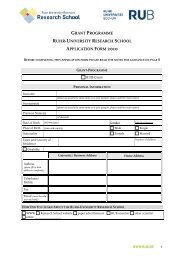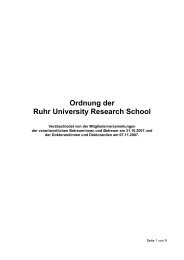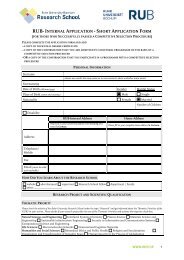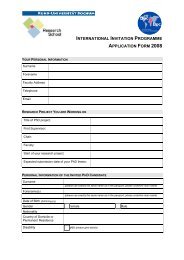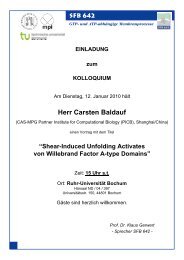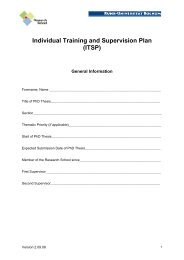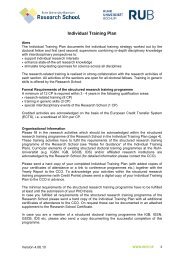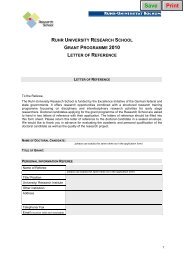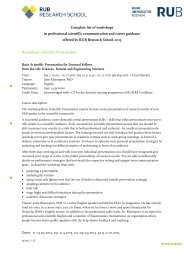Section Days abstract book 2010.indd - RUB Research School ...
Section Days abstract book 2010.indd - RUB Research School ...
Section Days abstract book 2010.indd - RUB Research School ...
You also want an ePaper? Increase the reach of your titles
YUMPU automatically turns print PDFs into web optimized ePapers that Google loves.
INSTITUTIONAL QUALITY, EXPORT PERFORMANCE<br />
AND ECONOMIC GROWTH<br />
Elias Fanta<br />
International Development Studies; Ruhr-Universität Bochum, 44780 Bochum, Germany<br />
e-mail: elias.fanta@rub.de<br />
There is consensus among scholars that openness and integration into the world economy is<br />
essential to realize the potential gain from trade. International trade brings a substantial positive<br />
change in the income growth of a trading country. There is extensive theoretical and empirical<br />
literature supporting this argument. Given constant returns to scale, perfect competition and the<br />
absence of distortions, traditional trade theory suggests that there are considerable welfare gains<br />
from market integration through trade. Though the majority of empirical studies confirm the<br />
notion that international trade brings about a substantial welfare gain, the findings are not always<br />
robust. For the same degree of openness some countries are more likely to benefit from trade than<br />
others. Redding and Venables (2002) indicate that during the last quarter century there have been<br />
wide variations in countries’ export performance. As a case in point, East Asian countries real<br />
export increased by more than 800% since the early 1970s, while the share of those of sub-<br />
Saharan Africa increased just by 70%.<br />
The dramatic increase in export of East Asian countries brings a spectacular economic<br />
growth for the respective countries, while most of sub-Saharan Africa and Latin American have<br />
been less able to harness the benefits of the openness of their countries (Borrmann et al, 2006).<br />
The main question evolving around this welfare discrepancies would be what are the<br />
prerequisites for a positive linkage between trade and growth and thus a successful trade<br />
liberalization strategy? A number of policy prerequisites would help to harness the benefits of<br />
trade. Countries that have better macroeconomic stability, well-functioning infrastructure and<br />
competitive markets may trade more than countries where these conditions are not met.<br />
In addition, to the above prerequisites, there are other important factors for a successful<br />
dismantling of trade barriers. One of the requirements is having institutions of high quality. As,<br />
Levchenko (2007) reveals an important feature of North-South trade is that it occurs between<br />
strikingly dissimilar countries and one of an important source of dissimilarity is institutional<br />
quality. The discrepancy in the quality of institutions might be one of the reasons for unequal<br />
distribution of the benefits of trade between North and South.<br />
The term institution is highly associated to the work of Douglass North. Institutions can<br />
be defined as humanly devised constraints that shape human interactions (North, 1990 p. 3). It is<br />
the rules of the game and enforcement mechanism in a society as defined by the prevailing<br />
explicit and implicit behavioral norms and their ability to create appropriate incentive<br />
mechanisms for desirable economic behavior.


